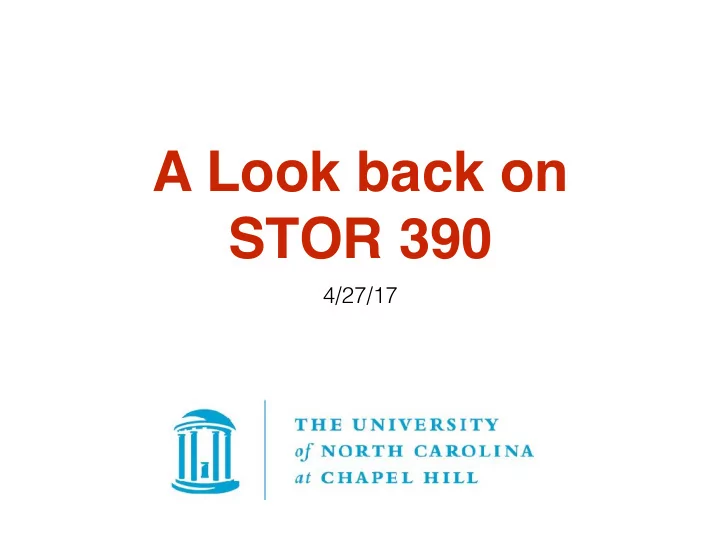

A Look back on STOR 390 4/27/17
Where did this course come from? Data@Carolina grant Iain Carmichael, Brendan Brown, Varun Goel, Dylan Glotzer, Marshall Markham, Shankar Bhamidi and many, many more: https://idc9.github.io/stor390/course_info/ acknowledgments.html
Outline What you learned (and what you didn’t) Why it’s important Broader perspective on data science
What skills you learned Programming in R Working with data Statistical modeling Effective Communication
You learned how to program in R Loops If/else Boolean logic Data types vectors, lists, strings, tibbles…
You can use R Studio R, R Markdown, Shiny Reports, data analysis, dashboards, interactive visualizations, resume, blog post, websites http://rmarkdown.rstudio.com/gallery.html https://shiny.rstudio.com/gallery/
You can work with tidy data Visualization ggplot, shiny Data munging/manipulation/transformation dplyr: select, mutate, group_by joins: filtering, mutating, etc Loading data read_csv
You can work with text data Regular expressions str_match, str_extract Natural language processing • tidytext unnest tokens, document term matrix, tf-idf
You have spent some time working with data data.gov Biodiversity in North Carolina MOMA IMDB Bike Sharing iPhone moment tracking Beauty and the Beast Harry Potter Final projects
You know how to acquire data for yourself Web scraping rvest, SelectorGaget APIs geocaching with google maps Twitter
You have seen different types of analyses Exploratory Inferential Predictive
You can do statistical modeling/machine learning Linear regression Classification KNN, Nearest Centroid, SVM Clustering K-means Model selection/tuning cross-validation Feature engineering factors, interactions, polynomial terms
You have learned about effective communication General principles/advise focus on message adapt to the audience Effective visual communication static plots (ggplot), dynamic plots (Shiny) Literate programming R Markdown
You have done a full data analysis Ask a question Acquire data Analyze some data Communicate results
Higher level skills Programming Ability to acquire data Identify problems that can be solved with data Classify data problems Communication
What you did not learn More advanced • programming • statistics Lot’s of experience
Be aware you know enough to be dangerous Very easy to make bad , but convincing data driven arguments Just because an algorithm says something does not imply it is meaningful/correct
Inference is hard Lot’s of great, existing statistics courses teach you inference Experience Critical thinking
Why these skills are important Better understanding of • data • science • technology See potential opportunities Empower you to do ______
Understand strengths and limitations of data, science and technology What is easy? What is hard? What can go wrong?
Look for potential opportunities Data can get at a lot of problems Basic understanding can go a long way
The ability to work with data empowers you to do _______ better What ever it is you are interested in medicine, sports, business, law, literature, “artificial intelligence”
Broader take aways Teach yourself Skepticism Yak-shaving Problem solving Trade-offs
Teach yourself MOOCs Coursera, edX, Udacidy Textbooks Stack exchange
Problem solving Break up a problem into smaller sub- problems Details
“Everyone has a plan until they get punched in the mouth.” –Mike Tyson
Problem solving Break up a problem into smaller sub- problems Details Adapt Persistence
Be unafraid of Yak Shaving Yak Shaving (noun) Any apparently useless activity which, by allowing you to overcome intermediate difficulties, allows you to solve a larger problem. https://en.wiktionary.org/wiki/yak_shaving
“There are three kinds of lies: lies, damned lies, and statistics.” –Mark Twain
Be skeptical Where did the data come from? biases, is it representative? Does the argument hold merit? where might it have gone wrong
“There ain’t no such thing as a free lunch.” –Milton Friedman
There are always trade-offs Time spend writing vs. quality More rigorous analysis vs. time/resources The best model depends on the data Just because you can doesn’t mean you should
Started the course with a quote from George Box
“All models are wrong but some models are useful.” –George Box
Box quote summarizes data science Optimism/tenacity • Maybe we can solve this problem? Skepticism • Why should I believe your solution? Science + engineering
Thanks! What could we do to make this course better? Stay in touch!
Recommend
More recommend